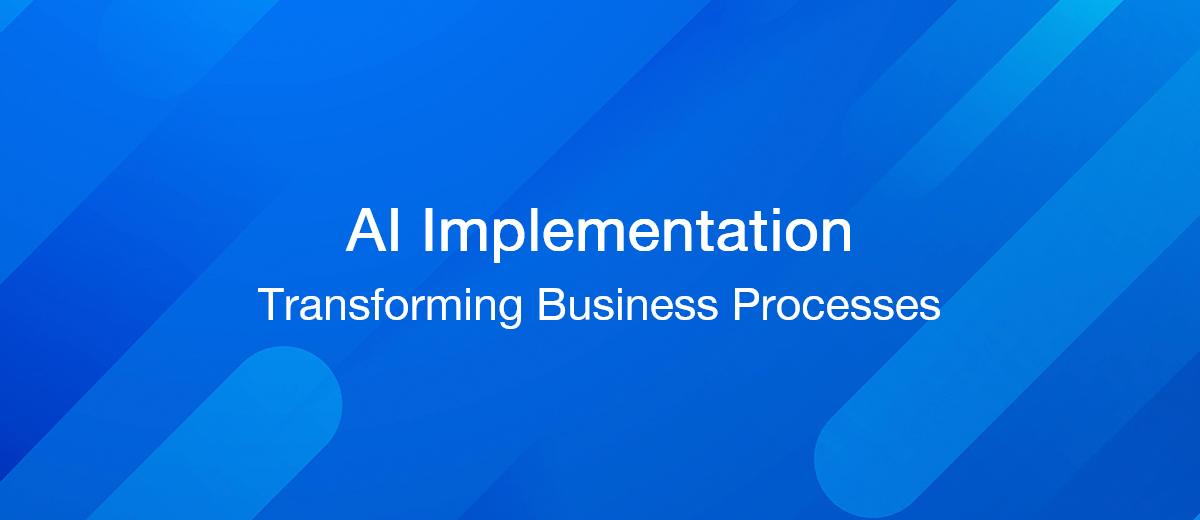AI Implementation: Transforming Business Processes
One of the main qualities of AI technologies is versatility. This allows them to be used effectively in many areas, including business process management (BPM). Artificial intelligence shows excellent results in this area. In our article, we will share the possibilities of using AI in business process. You will learn about current trends, advantages and challenges, recommendations for introduction, and striking examples of AI implementation.
Current Trends in the Use of AI in Business
Every year, artificial intelligence and machine learning are increasingly involved in business processes. According to the American research and consulting company Grand View Research, in 2020 the capitalization of the global AI market was $62 billion. By 2028, it could grow by 40%. Companies of different sizes and areas of activity are implementing these technologies into their corporate systems, using them to solve individual problems or entire areas. A powerful factor in the growth of AI implementation in business has been the emergence of publicly available generative neural networks. A 2023 survey of 254 top tech companies found that more than 90% of them use smart chatbots like ChatGPT or Bing Chat. At the same time, 80% of respondents said that in 2024 they are going to increase the volume of investments in AI technologies.
Business owners and managers see great promise in the integration of artificial intelligence. With its help, they want to increase productivity and the quality of business processes, optimize costs, stand out from competitors, and better adapt to market dynamics. Among the AI technologies available today, entrepreneurs highlight natural language processing (NLP) as the most useful for business.
Another study of key trends in the implementation of artificial intelligence in business was published by Forbes. In preparing the material, its employees interviewed representatives of 600 American companies. They managed to find out the following from them:
- 56% of respondents have already completed the implementation AI in customer service and support processes. This is currently the most popular area of integration.
- A slightly smaller share of entrepreneurs (51%) use AI for security tasks, including cybersecurity and fraud management.
- 47% of respondents use AI in virtual assistants. 46% use it for customer relationship management (CRM). 40% use it for inventory management. 35% create content using it.
- These promising technologies are also in demand in product recommendation (33%), supply chain management (30%), accounting (30%), recruiting, and personnel management (26%), audience targeting (24%).
Advantages and Benefits

Proper implementation of artificial intelligence in the operational activities of an enterprise provides it with many advantages. Among the most significant are:
- Business process automation. AI has serious potential to automate and optimize most manufacturing and service processes. Neural networks effectively control robotic lines, test, and work with programs, accept applications and make payments, communicate with clients, and interact with human workers.
- Savings when training staff. Artificial intelligence trains employees quickly and efficiently. Thus, it helps the business to significantly reduce its costs. The skill of self-learning increases its ability to adapt.
- Improved user experience. By learning on its own and processing gigantic amounts of data, AI excels at customer service tasks. Smart chatbots based on neural networks can communicate with users and provide them with personalized support 24/7. With their help, companies effectively strengthen audience loyalty.
- New level of analytics. Artificial intelligence has proven itself well in predictive analytics. It easily copes with processing big data, finds patterns, forms logical conclusions, and makes relevant forecasts. The capabilities of neural networks to analyze volumetric data in real-time help businesses make the right decisions faster and thus outperform competitors.
- Improved data protection. AI solutions for business provide a high level of data security, preventing hacking attempts, information theft, or other illegal actions. This is a critical advantage for those business areas that pay increased attention to data protection (for example, financial technologies and banks).
- Optimization of resource consumption. The latest AI models help businesses optimize a number of important work processes and thereby achieve tangible savings on key resources. To achieve this, they use 24/7 monitoring, faster data processing, lower operating expenses and reduced downtime. Additionally, they minimize the likelihood of human errors.
Disadvantages and Challenges
The spread of artificial intelligence in business has undeniable advantages. However, it is not without its shortcomings. Companies implementing such technologies may face significant challenges. Among the main ones are:
- Insufficient volume or poor quality of data. Information is the most significant factor in successful AI integration. The performance of neural networks and the results they generate directly depend on it. Even the slightest flaws here can lead to the fact that the implemented technologies turn out to be useless or even harmful to the business. To avoid this, companies should pay increased attention to data auditing and use robust data management systems.
- Compatibility with existing systems. Implementing AI into an existing enterprise management system, security platform, or supply chain often requires a major overhaul. During such updates, it is not enough to install several plugins. Instead, it will take much more action and resources. Before launching integration, we recommend conducting a thorough audit of the infrastructure and training staff.
- Choice of strategy. AI business implementation does not yet have universal algorithms, so companies have to choose and test their integration strategy on their own. At the preparatory stage, evaluate the available data, infrastructure, and overall business readiness for such significant changes. Then develop a roadmap outlining the sequence of activities, required resources, and expected completion date for the project.
- Ethical challenges and safety issues. As businesses implement artificial intelligence, they typically face ethical challenges related to the responsible use of new technologies. Another potentially dangerous factor is data security. To address these threats, companies need to effectively protect the personal information about customers and employees, and develop ethical standards for the use of AI.
How to Implement AI in Business
As mentioned earlier, the progress of integrating artificial intelligence into business processes is largely determined by the specifics of the company and the scope of its activities.
Today, there is no single instruction that could be applied in all sectors of business. Implementing AI is a complex process that requires a consistent approach. The following stages are distinguished:
- Identification. First, you need to determine which divisions of your company and areas of its activity need optimization the most. Most often, these include the most labor-intensive and routine tasks, such as customer service or data processing. Additionally, AI delivers the best results in business processes that require high speed and accuracy.
- Technologies. At this point, select the AI technologies you're interested in and research the major providers. Focus on the provider's experience, customer reviews, and the availability of solutions that suit you. Pay attention to adapting the selected technologies to your company's processes and objectives. It is worth considering their compliance with regulations, potential risks and security measures, and also calculating the costs of integration and expected profitability.
- Planning. Prepare a preliminary project plan, indicating the expected costs, timing, and results of implementing AI in business process management. Describe the responsibilities of employees who will implement and use new technologies. Be sure to consider the likely risks and difficulties of implementing the project, thinking through ways to solve them.
- Data. One of the most important stages of introducing AI into business is data audit. Before starting a project, you must be sure that their volume and quality will allow you to successfully implement the task and achieve the desired effect.
- Team. Finding qualified talent in the field of artificial intelligence and data management is another significant step. You will need to form a team to carry out the AI integration, consisting of data analysts, engineers, and project managers. In addition to the direct implementation of technology, specialists must train your staff to properly use AI in their work.
- Testing. After completing all of the above steps, be sure to test the functionality of the updated system before a full-scale launch. This will help you evaluate its performance, find and correct possible errors, and also collect feedback from employees and clients to improve the technology.
Examples of Artificial Intelligence in Business
Artificial intelligence is used in many business sectors, the number of which is growing steadily every year. We present to your attention a selection of current cases of successful implementation of AI in business processes from well-known companies.
Analytics
Meta Corporation integrated the DeepText deep learning model into its social network Facebook back in 2016. This allowed it to automate content processing to more quickly track the intent and interactions of its users. The neural network effectively analyzes thousands of posts in a matter of seconds, supporting over 20 languages. Based on the processed data, it evaluates the relevance of content, detects spam and cyberbullying, and generates personalized conclusions.
Quality control
Truck manufacturer Daimler Truck Asia (DTA) has decided to update its outdated manual quality control system with the help of artificial intelligence technologies. To achieve this, it ordered the development of an analytical AI platform from Deloitte, which was later called “proactive sensing.” It performs a comprehensive analysis of a large array of data: from the state of transport to activity on social networks. As a result, this allowed DTA to reduce problem detection time by 50%, reduce product warranty costs by $8 million and strengthen customer loyalty.
Customer service
One of the largest insurance companies in the United States, Humana, implemented an artificial intelligence model to automate the processing of customer applications. Previously, it had only used a voice chatbot to handle calls, but it couldn’t cope with many requests and redirected them to support staff. Then the company introduced a new AI chatbot based on the IBM Watson model. It has more advanced natural language understanding skills, which help it process many more requests and generate relevant responses to them. Thus, Humana doubled the number of requests accepted by the bot, reducing support costs and customer service time.
Conclusion
The integration of business intelligence and AI is a promising trend that brings many important benefits to companies. Thanks to it, they are able to optimize a number of key business processes. This includes the automation of repetitive or time-consuming tasks, productive and accurate analytics, and effective HR management. On the other hand, it is necessary to take into account certain challenges that companies face during the implementation of AI. To minimize risks and get maximum benefits from implementation, a business should seriously prepare for it. It needs to assess existing data and infrastructure, determine organizational readiness, and select a team of professionals.
Time is the most valuable resource for business today. Almost half of it is wasted on routine tasks. Your employees are constantly forced to perform monotonous tasks that are difficult to classify as important and specialized. You can leave everything as it is by hiring additional employees, or you can automate most of the business processes using the ApiX-Drive online connector to get rid of unnecessary time and money expenses once and for all. The choice is yours!

